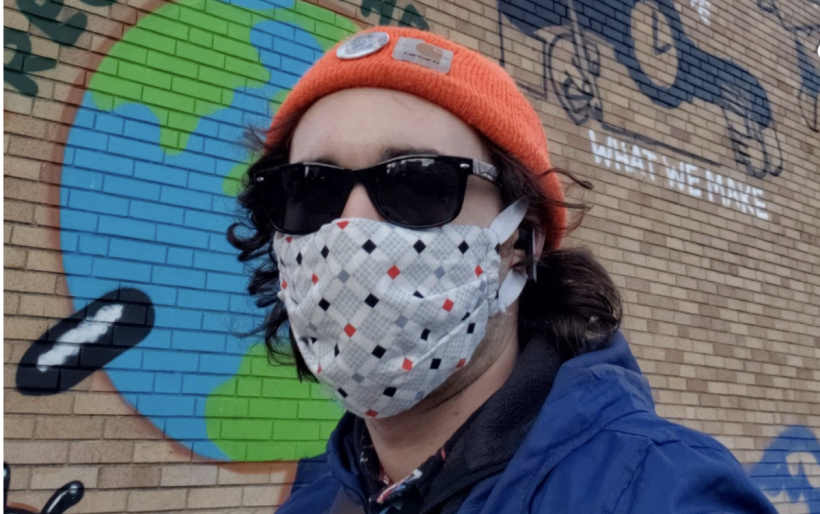This is Essential: Mitch Esparza

During the coronavirus pandemic most people have been forced to work from home or, worse yet, they’ve been laid off or furloughed. But not everybody. We decided it would be interesting and important to shine a spotlight on some of the essential workers who are also members of our music community for a new series we’re calling This Is Essential.
“It’s been very weird” is how Mitch Esparza described going into Center City every day for their job as a legal assistant in the immigration court. While the court itself is not in session, Esparza is still quite busy and it’s nothing that can be done remotely. As they explained: “My job doesn’t make sense to do from home.”
What is a legal assistant? On a basic level what Esparza does is communicate between clients and the court, which is under the Department of Justice. Even now with things shut down because of the pandemic, there are still upcoming cases which means Esparza has to be in the office to go through documentation.
“Going down to Center City every day is very eerie and sort of nerve wracking,” they told The Key. “But I have this plastic bag with Lysol wipes I carry everywhere in my pocket and I have gloves on and my mask.”
While Esparza has only been a legal assistant for three years, this feels like a perfect job for them. Not only do they obviously care about the plight of immigrants but being born and raised in Mexico they’re completely bilingual.
When they’re not at work, Esparza is a talented guitarist who plays in Love Club, Chronic Anxiety, and has a solo project. They also co-own and run Bunny Cat Records.
The Key: What does it mean to be a legal assistant in immigration court? What are your job duties?
Mitch Esparza: I work for the judges and I’m the point of contact for people involved in the cases. I’m basically the point of contact for the general public outside of the courtroom. In the courtroom everyone’s addressing the judge but outside the courtroom it would be compromising of a case if you could just contact the judge outside of the record, what’s called ex parte communications.
So basically if it wasn’t for my position, the case would move nowhere because someone has to be able to accept documents and then put them in the file. The judges don’t do that. And then anything else: when the judge signs an order I’m the one issuing that order and sign off on everything. Every notice that goes out for a case, every order that the judge issues, I’m the one sending it physically out and then also putting it into the file and our electronic system for tracking the files.
On top of that I also do my shifts at the window, which is basically the reception for the court. When you come to court I’m one of the first people you’ll see. After you’ve passed through security downstairs you’ll come upstairs and then basically I’ll greet you at the window and give you your turn in court and explain how you should just wait for your attorney if you have one or, you know, wait for your turn to be called up because I see everybody with an attorney first.
I’m one of the few people on staff that isn’t an interpreter in the courtroom who [also] speaks Spanish so I’m called up to the window a lot because, of course, most of the people being deported [are originally from Latin American countries]. It’s also referred to as being removed, they don’t use the words “deportation” or “deported” anymore. They’re called removal proceedings.
TK: Where are most of the people you’re seeing from?
ME: The vast majority of the population that is being, you know, put through the process is of course [from] El Salvador, Honduras, Guatemala. There’s a fair amount of Portuguese cases, a fair amount of other nationalities sprinkled around, but it is an overwhelming number of Latin American people that just don’t speak any English in the way I speak Spanish.
So the reason why I really like my job and the reason I do it and deal with the emotional labor of it is because, you know, [these] people are at court and it’s the worst day of their life. One of the worst days of their lives. And it’s nerve racking and the system is generally stacked against them. It’s particularly really stacked against you if you don’t speak the fucking language because it’s confusing no matter what if you’re a layman. But if you don’t speak English it’s even more confusing. And if you have somebody with a fucking attitude when you come in there, it’s that much worse and that much more stressful and more traumatic.
I make it a point to be extremely patient and extremely kind and give them the information that they need the most that gives them the best chance to be informed of what they need to do.
TK: Like what?
ME: You need a lawyer. Hopefully a good one. Because your chances are much better with a lawyer. Of course I’ve seen people without a lawyer [whose cases] pan out but – and I say this a lot, too – I would need a lawyer and I work here. The thing is they say that a person who has themselves as a lawyer has an idiot as a representative. [laughs] Though I’ve definitely seen some dipshit lawyers and that’s part of a whole ‘nother problem.
Philadelphia court is not detained; people are coming in on their own. But of course part of immigration court or the detained facilities is when people are being removed they’re taken to detention facilities where they still have opportunities [like] requesting a bond and requesting a motion to reopen or appeal to the Board of Immigration Appeals.
TK: Except for the obvious of the courts being temporarily shut down, how have things changed in the past month?
ME: The office in Center City is kind of a ghost town. My job hasn’t changed very much other than that it’s slightly more confusing and slightly more stressful in a different way than normal. Normally it’s stressful because I’m dealing with people that are in a really tough situation. They’re really nervous and there’s a lot of fear in people’s voices when they’re talking to me and that’s emotionally taxing. Absent of that it’s actually been kind of easier. My life is actually slightly easier in this kind of realm, which is just so eerie and creepy and kind of messed up.

TK: How did you end up at this job? What did you go to school for?
ME: I was in entertainment management. I did this weird collection and archival work for a while for a pretty big-named client. I was very fed up with breathing in dust from vinyl records so then I was like, “Okay, I’m going to be an electrician.” Meanwhile I’ve been spending years firing off resumes to city and federal agencies because I wanted to get a job that could give me paid time off and not [be] shift work and genuinely be able to save money.
I got a job at the police headquarters for a hot second in the finance office, just like randomly, and then I think that clerical experience gave me a leaning to wind up getting called for an interview for this position that I applied for randomly off of USAJobs.com. I wasn’t even sure what I was applying for. It just said “bilingual, helping people that don’t speak English, in a public setting.” And I thought, “Okay, I can do that cause I speak Spanish, I grew up in Mexico.”
So I just applied and then got called for the interview. But it turns out my boss is amazing and everybody that works for the court is a sweet person that has a heart and is genuinely good. I can say that Philadelphia is doing really good things. Some of the judges in Philly are some of the best people I’ve ever met. My court administrator is a personal role model to me.
One of the issues with the immigration court is that every single one across the country is kind of a snowflake. And that’s an issue, right? Justice should be blind; you shouldn’t have courts be a snowflake.
But I’m lucky to say that I landed in Philadelphia. I don’t know if I would necessarily work for any other court or [at least] any other immigration court other than the Philly one unless I knew it was as good.
TK: Even if you kind of happened by chance into this job it seems like a really good fit.
ME: Holy shit yes. I’m kind of astounded. From this job I plan on being an interpreter, too. Because I’ve been able to get a bunch of resources through my job and the people that I’ve met, I’m now becoming a certified court interpreter. I take that test in June and hopefully I’ll just start doing some interpreting work, too.
TK: Why is legal interpretation so important?
ME: First of all it’s about equality of access. So it’s a pretty essential thing for someone who doesn’t understand English for them to actually be afforded the same rights in a legal process in a court of law. Like to be given the same justice as somebody who was competent in the language. So the idea of having an interpreter is pretty essential to just the operation of a courtroom if you really think about the actual fairness of a trial.
Standards have really kind of varied over time. You can actually do a fair amount of legal interpretation and stuff like that working for agencies so long as you pass the test for those. What I’m trying to do is be a Pennsylvania state court interpreter. So for that you have to just pass basically a test. You do a written test and then you do an oral component where they can assess that you’re proficient in doing the simultaneous, which is like as it’s happening in the courtroom, and then consecutive, which is like with a pause involved, allowing you time to interpret. And then reading aloud a document into a different language.

TK: Let’s switch gears a bit and talk about music. You’ve been playing in bands and stuff for 15 years or so?
ME: Oh yeah, at least since I’ve moved to the city. Well, even before that. In high school I played music in terrible bands. I started my solo stuff in high school. Instead of finishing high school in Mexico and trying to move to the States afterwards I was given this opportunity that was basically, “You can go to high school in the United States and you’ll have an easier time of trying to get into a college.” I didn’t know of any scenes in the community that I was [part of] in Mexico so I moved to the States to finish high school and be involved in a music scene that was active, where bands came through town.
TK: Has your as your time time in punk and DIY informed your politics? Or were they basically informed from growing up in from Mexico?
ME: No, absolutely not. If I had stayed in Mexico it would have taken a lot longer time for me to have come out of the closet. You know, people get along down there calling each other puto which means faggot, honestly, you know like as “dude.” For that to be the actual reality? Punk and hardcore music was an outlet to be weird and they were calling me a puto because of that.
Rage Against the Machine was a big thing for me. Their documentary The Battle of Mexico City is still one of the most comprehensive American pieces of journalism and popular culture that I’ve seen that actually documented the EZLN properly. They had an actual statement from [spokesperson of the Zapatista group Subcomandante] Marcos just giving them his best wishes. I just rewatched it the other day.
TK: Did you see that when you were a teenager for the first time?
ME: Yeah and I was just blown away. I was like, “What the fuck, they actually got Marcos?!” The guy that was wanted by the federal government in Mexico and here they have an interview with him and he’s giving them his best wishes.
TK: I look at your job and despite the fact that you work for the DOJ I see it within the context of radical politics. You’re helping people out and giving them more of a fighting chance than they have otherwise. Has your time in punk been an influence when it comes to politics and activism?
ME: Yeah, 100 percent. Especially the Philly scene, the amount of activism that’s been sort of infused into particularly our circle of people [where] shows have really taken a much more activist stance. Granted a decent amount of that is sort of performative but the reality is that there are very genuine [people involved]. There’s a lot of important stuff going on in Philly and particularly in terms of the activist scene. Get Better Records, for example, has been so informative for me. That’s been a huge influence.
TK: What’s going on with your bands? The active or semi-active ones are Love Club, Chronic Anxiety [ed. note: this reporter’s defunct band put out a split with Chronic Anxiety a couple years ago], and your solo stuff.
ME: Everything is on hold, of course. I had started recording my solo record with Jeff Zeigler. I put MEMO up [online], which is basically demos of what the solo record is going to sound like. But it’s going to be a lot more expansive because it’s been two years or a year and a half since I put out the demo. It’s going to be loop-based stuff mixed in with my regular songwriting but in more of a solo context.
Love Club has an album’s worth of material that we’ve just been sitting on for the past, like, years. For a while we were practicing it every week but now we have all this material sort of ingrained. It was my intention for this record to have this completely marinated thing that just sat for years marinating in our thoughts. A song evolves when you’ve learned it and you’ve been playing it for years and you start doing silly shit that you really wouldn’t normally do because you’re kind of bored with it. So I want to go into a recording studio and bang out a record that was just so rehearsed it was second nature. And in a real way kind of building-in procrastination into the process but at the same time seeing what that really sounds like as a band and not really having a timeline on it.
I’ve been doing the same thing with my solo project, too. I have this sort of philosophy with music that if it’s not fun then you shouldn’t be doing it. So I’m not going to fuck with it if it’s not a good time and I’m not gonna fuck with you if you’re a burden to me or if you’re not a good time.
So yeah, I have pretty much an album’s worth of Love Club material which we’ll record one day. But my priority right now is to finish this album with Jeff Zeigler which got put on hold. We started tracking and then corona hit. So the second recording session got canceled. I’m thinking about tracking some stuff at home but I don’t know. We’ll see where that goes.
TK: Have you been playing playing at home at all?
ME: Oh yeah, a lot. If people want to follow me on Instagram I’ve been posting a lot of demos.
TK: You live with GG and Pierce from Soul Glo. Have you started a house band yet with those two?
ME: No, not yet. Soul Glo have a new album coming out that’s going to be really, really, really good. I’ve been listening to it at home because they’ve have been listening to the tracks. Maybe I’ll just steal GG and Pierce and start our own band! [laughs] Psych, I don’t think it’s going to happen. But we have been messing around on Ableton and making beats. Mainly GG and Pierce have been making a lot of cool beats but, I don’t know, I kind of have this fantasy of putting together this like weird trappy Ranchero noise sort of thing with Ableton.
TK: I mean, that sounds much better than most people’s quarantine projects. So except for Soul Glo, what other music has been getting you through the day?
ME: Honestly Soul Glo has been doing a lot, at least in the way that Pierce and GG are turning me on to a lot of music that I hadn’t listened to before. I’ve been really listening to a lot of hip hop lately. They really turned me on to Bad Bunny.
TK: He’s great! He has good politics, too.
ME: Bad Bunny has really changed my life in some ways. I’m really in love with Bad Bunny!
I don’t know how it took me this long but I just recently discovered Rihanna, which kind of blew my mind. Definitely a stark contrast but I just discovered Blood Incantation.
TK: Nice! I was about to say that everything you’re listening to is very feel good but maybe not.
ME: I’ve been going crazy with Spotify. After the assault [ed. note: Mitch was beaten up badly about a year ago in what was suspected to be a homophobic attack] I had a lot of free time and couldn’t do much aside from just sit there and listen to stuff. So I finally made a Spotify account and I’ve been trying to just pack it full of all this stuff that I really like. I feel like I avoided it for a while because it didn’t have a lot of stuff that I really like but now you can find that weird Roland Kirk recording. I’ve also been revisiting stuff from my youth that I didn’t remember and it’s just, like, “Oh shit, yeah, this was amazing.” For example I hadn’t listened to Broken Social Scene in years and then all of a sudden I can just put all those albums on.
Slutever found its way onto my Spotify and it takes me back to when they lived in Philly and we were playing [shows together] all the time. It’s that kind of thing. Slutever was cool.

TK: And as far as current bands?
ME: Empath. I love Empath, oh my God. I like the fact that they’ll throw an ambient recording in there. I really like that one song “Soft Shape,” that’s a really good song. I’m all about them. Sheer Mag is another one. There’s something very nostalgic about it. And then of course the Smarthearts, which sort of sounds like a male-fronted Sheer Mag but in a great way.
The other stuff I’ve been listening to a lot has been building up my ranchero playlist and just my Latin music playlist. GG turned me on to a lot of Hector Lavoe and Larry Harlow. Also Perez Prado and all the ranchero stuff from Mexico I grew up with like El Coyote y Su Banda and Tigres del Norte.
TK: I want to bring this all the way back around and talk about work one last time. As someone who is Mexican but lives in the United States –
ME: I was born and raised in Mexico [but] my mom is American.
TK: So you were born a dual-citizen? Same with me. I wasn’t born in the States but because my mom held a U.S. passport I was able to get citizenship.
ME: Yeah, basically. My parents applied for me to get a passport when I was a baby.
TK: What’s the feeling for you as someone who is both a Mexican and American national working a job where you’re dealing with Latin American immigrants who are desperately trying to stay in the States?
ME: I think about that all the time. There should be pathways for people to be in this country and make a living. The reality is that it’s a method to subjugate people and it always has been. So in a stacked system I’m here to at least be somewhat of an equalizer in some capacity.
TK: Are the people you’re working with excited to find out you’re from Mexico?
ME: Yeah, I get rushed when they hear my accent. “Oh it’s someone who can answer my questions and won’t yell at me!” It’s like that.
TK: I was thinking about that earlier. You’re not necessarily on the other side of things but you’re definitely straddling the line.
ME: It feels like I’m feeding people into the Nebuchadnezzar, cause that’s what the justice system is. If you don’t have your wits about you and if you’re not really careful and going about things the right way they make it seem like you’re fucking your life up. No, they’re fucking your life up and it’s up to you to put up the right fight for them not to fuck your life up.
TK: Does it ever feel weird being in this position but having the background that you do?
ME: It’s extremely strange. It’s surreal.
TK: At the end of the day do you feel like you’re doing the right thing in the world?
ME: In terms of what I’m doing for people and how I’m treating people and contributing to their experience in this fucked up mess? Yeah, that’s my contribution. That’s where I’m actually making a difference.
TK: I know you said you applied to this job not really knowing what it would entail but it does seem like it really suits you. Is there a sense of responsibility or duty that you have because of your own personal and political background to the folks that you’re working with?
ME: It’s definitely like that for me. Again it’s why I’m lucky to be in Philly where I can actually afford to feel that way. If I was in a more conservative city I wouldn’t have that luxury. It’s a privilege and I’m a very privileged person to even be in my position and just being an American citizen. It’s an odd position of power, however meager the power is.
TK: The way I’ve always considered privilege and power is that it’s something I should use to uplift and give a voice to others. Is that something you see as part of your job?
ME: Yeah and in life in general. Everybody deserves a decent reality. If you have it, share it. Like, I didn’t keep those Trump dollars. I spread it around. I’m [still] earning a paycheck, you know what I mean? How am I supposed to get a relief check when an immigrant working under the table isn’t getting a check? No, pass it along, bro. Please.
